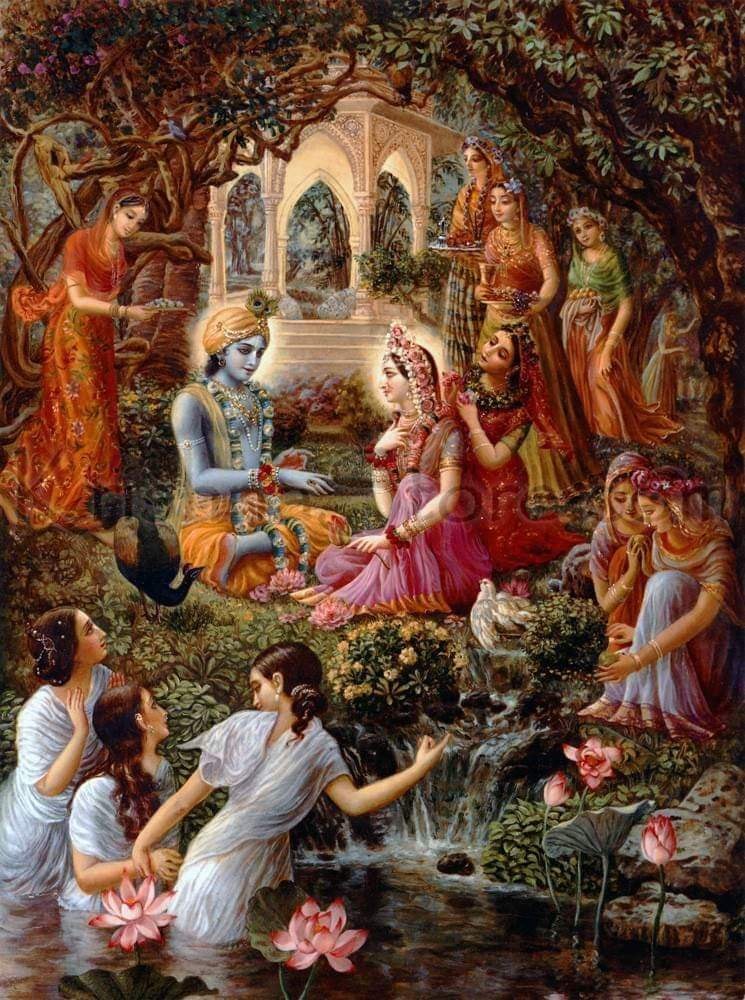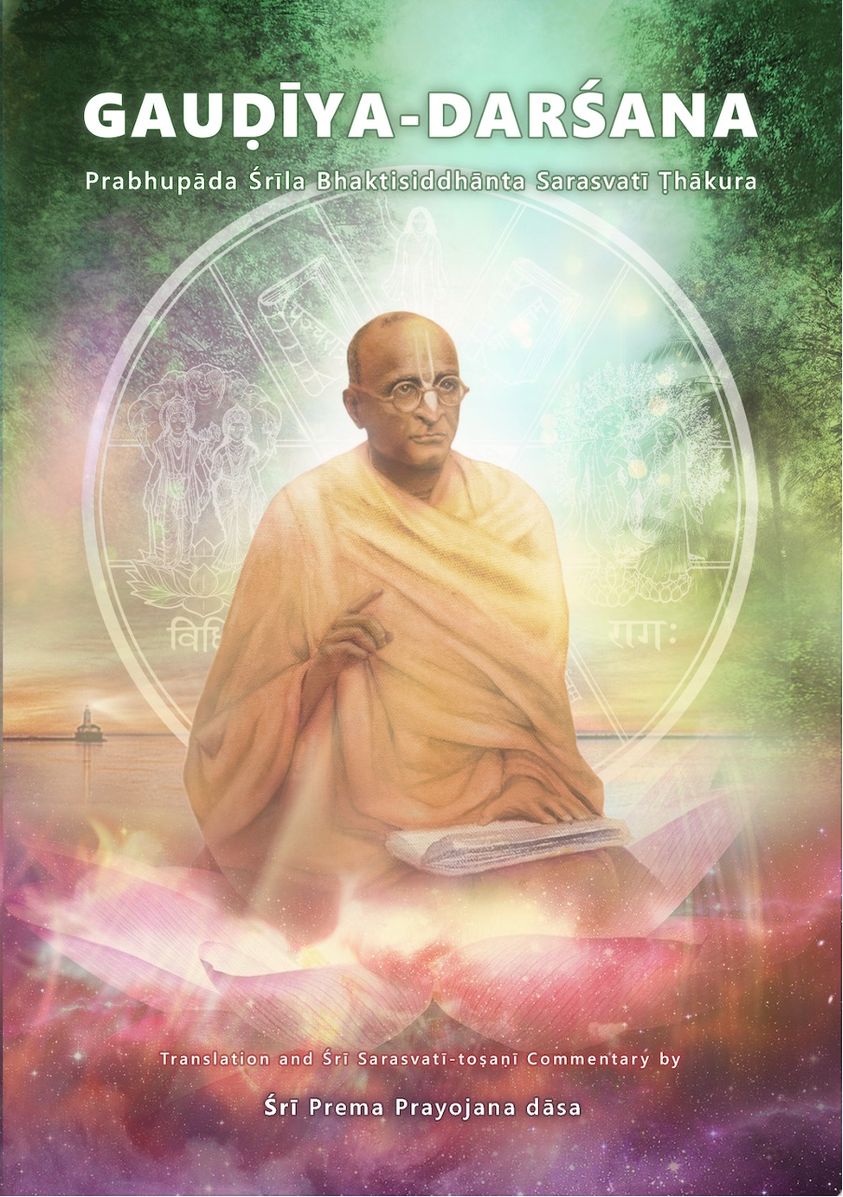An exerpt from Srila Bhaktivinodha Thakuras Jaiva Dharma
“The nature of the soul”
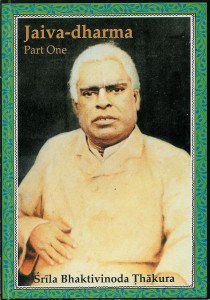
Vrajanatha: What is this philosophy called Mayavada? I am unable to understand it.
Babaji: Listen carefully. Maya-sakti is just a perverted reflection of the spiritual kingdom, and it is also the controller of the material world which the jiva enters when he is overpowered by ignorance and illusion. Spiritual things have an independent existence, and are independently energetic, but Mayavada does not accept this. Instead, the Mayavada theory declares that the individual soul is itself brahma, and only appears to be different from brahma because of the influence of maya. This theory states that the jiva only thinks himself to be an individual entity, and that the moment the influence of maya is removed, he understands that he is brahma. According to this conception, while under the influence of maya, the atomic spiritual spark has no independent identity separate from maya, and therefore the way of liberation for the jiva is nirvana, or merging in brahma. Mayavadis do not PRAMEYA: BHEDABHEDA-TATTVA or accept the separate existence of the pure individual soul. Furthermore, they state that Bhagavan is subordinate to maya, and has to take shelter of maya when He needs to come to this material world. They say, “This is because brahma is impersonal and does not have any form, which means that He has to assume a material (mayika) form in order to manifest Himself in this world. His Isvara aspect has a material body. The avataras accept material bodies and perform wonderful feats in this material world. In the end, They leave Their material body in this world, and return to Their abode.”
Mayavadis show a little kindness towards Bhagavan, for they accept some differences between the jiva and the avataras of Isvara. The distinction they make is that the jiva has to accept a gross body because of his past karma. This karma carries him away, even against his wishes, and he is forced to accept birth, old age and death. The Mayavadis say that Isvara’s body, designation, name and qualities are also material, but that He accepts them of His own accord, and that whenever He desires, He can reject everything and regain His pure spirituality. He is not forced to accept the reactions resulting from the activities that He performs. These are all misconceptions of the Mayavadis.
Vrajanatha: Is this Mayavada philosophy found anywhere in the Vedas?
Babaji: No! Mayavada cannot be found anywhere in the Vedas. Mayavada is Buddhism, We read in Padma Purana:
mayavadam asac-chastram
pracchannam bauddham ucyate
mayaiva vihitam devi
kalau brahmana-murtina
Uttara-khanda (43.6)
In answer to a question by Umadevi (Parvati), Mahadeva explains “O Devi! Mayavada is an impure sastra. Although actually covered Buddhism, it has gained entry into the religion of the Aryans, disguised as Vedic conclusions. In Kali-yuga, I shall appear in the guise of a brahmana and preach this Mayavada philosophy.”
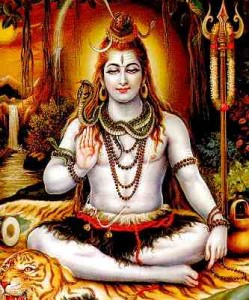
Mahadeva Lord Siva
Vrajanatha: Prabhu, why did Mahadeva perform such an ugly task, when he is the leader of the devatas and the foremost among Vaisnavas?
Babaji: Sri Mahadeva is Bhagavan’s guna-avatara. The supremely merciful Lord saw the asuras taking to the path of bhakti and worshiping Him to get fruitive results and to fulfill their wicked desires. He then thought, “The asuras are troubling the devotees by polluting the path of devotional service, but the path of bhakti should be freed from this pollution.” Thinking thus, He called for Sivaji and said, “O Sambhu! It is not auspicious for this material world if My pure bhakti is taught amongst those who are in the mode of ignorance and whose character is asurika. You should preach from sastra and spread Mayavada philosophy in such a way that the asuras become enamored and I remain concealed from them. Those whose character is asurika will leave the path of devotional service and take shelter of Mayavada, and this will give My gentle bhaktas the chance to taste pure devotional service unhindered.”
Sri Mahadeva, who is the supreme Vaisnava, was at first somewhat reluctant to accept such an arduous task with which Bhagavan had entrusted him. However, considering this to be His order, he therefore preached the Mayavada philosophy. Where is the fault of Sriman Mahadeva, the supreme guru, in this? The entire universe functions smoothly like a well-oiled machine under the guidance of Bhagavan, who expertly wields in His hand the splendid Sudarsana Cakra for the well-being of all creatures. Only He knows what auspiciousness is hidden in His order, and the duty of the humble servants is simply to obey His order. Knowing this, the pure Vaisnavas never find any fault in Sankaracarya, Siva’s incarnation who preached Mayavada. Listen to the evidence from sastra for this:
tvam aradhya tatha sambho grahisyami varam sada
dvaparadau yuge bhutva kalaya manusadisu
svagamaih kalpitaistvanca janan madvimukhan krru
manca gopaya yena syat srstiresontarontara
Padma Purana, Uttara khanda (42.109-110) and Narada-pancaratra (4.2.29-30):
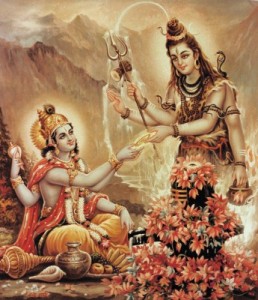
Visnu said, “O Sambhu, although I am Bhagavan, still I have worshiped different devatas and devis to bewilder the asuras. In the same way, I shall worship you as well, and receive a benediction. In Kali-yuga you should incarnate amongst human beings through your partial expansion. You should preach from sastras like Agama, and fabricate a philosophy that will distract the general mass of people away from Me, and keep Me covered. In this way, more and more people will be diverted away from Me, and My pastimes will become all the more valuable.”
In Varaha Purana, Bhagavan tells Siva:
esa moham srjamy asu ye janan mohayisyati
tvanca rudra mahasaho mohasastrani karaya
atathyani vitathyani darsayasva mahabhuja
prakasam kuru catmanamprakasanca mam kuru
“I am creating the kind of illusion (moha) that will delude the mass of people. O strong-armed Rudra, you also create such a deluding sastra. O mighty-armed one, present fact as falsehood, and falsehood as fact. Give prominence to your destructive Rudra form and conceal My eternal original form as Bhagavan.”
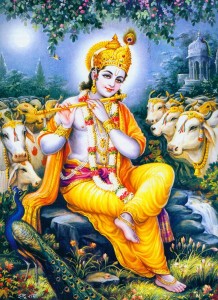
Bhagavan Lord Krishna
Vrajanatha: Is there any Vedic evidence against the Mayavada philosophy?
Babaji: All the testimony of the Vedas refutes Mayavada philosophy. The Mayavadis have searched all the Vedas and isolated four sentences in their support. They call these four sentences mahavakya, ‘the illustrious statements.’ These four statements are:
1) sarvam khalv idam brahma, “All the universe is brahma.” Chandogya Upanisad 3.14.1.
2) prajnanam brahma, “The supreme knowledge is brahma.” Aitareya Upanisad 1.5.3.
3) tat tvam asi svetaketo, “O Svetaketu, you are that” Chandogya Upanisad 6.8.7.
4) aham brahmasmi, “I am brahma.” Brhad-aranyaka Upanisad 1.4.10.
The first maha-vakya teaches that the whole universe, consisting of the living beings and non-living matter, is brahma; nothing exists that is not brahma. The identity of that brahma is explained elsewhere:
na tasya karyam karanam ca vidyate
na tat-samas cabhyadhikas ca drsyate
parasya saktir vividhaiva sruyate
svabhaviki jnana-bala-kriya ca
Svetasvatara Upanisad (6.8)
None of the activities of that para-brahma Paramatma is mundane, because none of His senses – such as His hands and legs – is material. Thus through the medium of His transcendental body, He performs His pastimes without any material senses, and He is present everywhere at the same time. Therefore, no one is even equal to Him, what to speak of being greater than Him. The one divine potency of Paramesvara has been described in sruti in many ways, among which the description of His jnana-sakti (knowledge), His bala-sakti (power), and His kriya-sakti (potency for activity) are most important. These are also called citsakti or samvit-sakti; sat-sakti or sandhini-sakti; and anandasakti or hladini-sakti respectively.
Brahma and His sakti are accepted as non-different from each other. In fact, this sakti is said to be an inherent part of brahma, which is manifested in different ways. From one point of view, it may be said that nothing is different from brahma, for the potency and the possessor of potency are non-different. However, when we look at the material world, we can see that in another sense brahma and His sakti are certainly different.
nityo nityanam cetanas cetananam
eko bahunam yo vidadhati kaman
Katha Upanisad (2.13) and
Svetasvatara Upanisad (6.10)
He is the one supreme eternal being among all eternal beings, and the one supreme conscious being among all conscious beings. He alone is fulfilling the desires of everyone. This statement from the Vedas accepts variegatedness within the eternally existing substance (vastu), brahma. It separates the sakti (potency) from saktiman (the possessor of the potency), and then it considers His jnana (knowledge), bala (power) and kriya (activities).
Now let us consider the second maha-vakya, prajnanam brahma, “The supreme knowledge is brahma“ (Aitareya Upanisad 1.5.3). Here it is said that brahma and consciousness are identical. The word prajnanam, which in this sentence is said to be one with brahma, is also used in Brhad-aranyaka Upanisad (4.4.21), where it is used to mean prema-bhakti: tam eva dhiro vijnaya prajnamam kurvita brahmanah, When a steady and sober person attains knowledge of brahma, he worships Him with genuine loving feelings (jnana-svarupa-prema-bhakti).
The third maha-vakya is tat tvam asi svetaketo, “O Svetaketu, you are that,” (Chandogya Upanisad 6.8.7). This sloka gives instructions on oneness with brahma, which is more elaborately described in Brhad-aranyaka Upanisad (3.8.10) as follows:
yo va etad aksaram gargy aviditvasmal lokat praiti sa krpanah
ya etad aksaram gargi viditvasmal lokat praiti sa brahmanah
O Gargi! Those who leave this material world without understanding the eternal Visnu are krpanah, extremely miserly or degraded, whereas those who leave this material world in knowledge of that Supreme Eternal are actually brahmanas, knowers of brahma.
The words tat tvam asi therefore mean, “He who gains true knowledge eventually attains devotional service to para-brahma, and he is to be known as a brahmana.” The fourth maha-vakya is aham brahmasmi, “I am brahma” (Brhadaranyaka Upanisad 1.4.10). If the vidya that is established in this vakya does not become bhakti in the end, then it is thoroughly condemned in Sri Isopanisad (9), which says:
andham tamah pravisanti ye ’vidyam upasate
tato bhuya iva te tamo ya u vidyayam ratah
Those who are situated in ignorance enter deep darkness, and those who are in knowledge enter deeper darkness still. This mantra means that those who embrace ignorance, and do not know the spiritual nature of the soul, enter the darkest regions of ignorance. However, the destination of those who reject ignorance, but who believe that the jiva is brahma, and not a spiritual atom, is far worse.
Baba! The Vedas have no shoreline and are unsurpassed. Their precise meaning can only be understood by studying each and every sloka of the Upanisads separately, and by deriving the meaning from all of them combined. If one singles out a particular sentence, he
may always be diverted by some misinterpretation. Sri Caitanya Mahaprabhu therefore investigated all the Vedas thoroughly, and then preached that the individual spirit souls and the material world are simultaneously and inconceivably one with Sri Hari and different from Him.
Vrajanatha: I understand that the Vedas establish the teaching of acintya-bhedabheda-tattva. Will you please explain this more clearly with proofs from the Vedas themselves?
Babaji: Here are some of the many passages that describe the oneness aspect (abheda-tattva) of bhedabheda-tattva: sarvam khalv idam brahma, “Everything in this world is certainly brahma.” (Chandogya Upanisad 3.14.1) atmaivedam sarvam iti, “Everything that is visible is spirit (atma).” (Chandogya Upanisad 7.52.2) sad eva saumyedam agra asid ekam evadvitiyam, “O gentle one, this world initially existed in a non-dual, spiritual form; and before the manifestation of this universe, the Supreme Spirit was just a non-dual substance.” (Chandogya Upanisad 6.2.1)
evam sa devo bhagavan varenyo yoni-svabhavan adhitisthaty ekah,
“Bhagavan Himself is the master of all, even of the devatas, and He is the only one who is worthy of worship. He is the cause of all causes, but He Himself remains unaltered, just as the sun remains stationary, while spreading its radiance in all directions.” (Svetasvatara Upanisad 5.4) Now listen to the mantras that support bheda (difference):
- om brahma-vid apnoti param, “One who understands brahma attains the para-brahma.” (Taittiriya Upanisad 2.1)
- mahantam vibhum atmanam matva dhiro na socati, “A sober, intelligent person does not lament, even on seeing a soul confined in a material body, because he knows that the soul is great and present everywhere.” (Katha Upanisad 1.2.22)
- satyam jnanam anantam brahma yo veda nihitam, “Brahma is truth, knowledge and eternity personified. That brahma is situated in the spiritual sky (Paravyoma), and is also present in the depth of all living entities’ hearts. One who knows this attains siddhi through his relationship with that indwelling Supersoul (antaryami), the omniscient brahma.” (First Anuccheda of Taittiriya-brahmananda-valli)
- yasmat param na param asti kincit…, “There is no truth superior to that Supreme Person. He is smaller than the smallest, and greater than the greatest. He stands alone, immovable like a tree in His self-effulgent abode. This entire universe rests within that one Supreme Person.” (Svetasvatara Upanisad 3.9)
- pradhana-ksetra-jna-patir gunesah, “The Parabrahma is the Lord of the unmanifested material nature (pradhana), the Master of that Paramatma who knows all the individual living entities, and the Isvara of the three modes of material nature. He is Himself transcendental to the modes of material nature.”(Svetasvatara Upanisad 6.16)
- tasyaisa atma vivrnute tanum svam, “He reveals His body only to those people in a very particular way.” (Katha Upanisad 2.23)
- tam ahur agryam purusam mahantam, “Those who know the Absolute Truth chant His glories, knowing Him to be Mahan Adi-purusa, the Great Personality, and the Cause of all causes.” (Svetasvatara Upanisad 3.19)
- yathatathyato ‘rthan vyadadhat, “By His inconceivable potency, He maintains the separate identities of all the eternal elements, along with their particular attributes.” (Isopanisad, Mantra 8)
- naitad asakam vijnatum yad etad yaksam iti, “Agnideva, the devata of fire said to the assembled devatas, ‘I cannot fully comprehend the identity of this yaksa.’ ” (Kena Upanisad 3.6)
- asad va idam agra asit…, “In the beginning, this universe was just an unmanifested form of brahma. This unmanifest became manifest in the form of brahma. That brahma manifested Himself in male form. For this reason that male form is known as the creator.” (Taittiriya Upanisad 2.7.1)
- nityo nityanam, “Who is the supreme Eternal Being among all the eternal beings?” (Katha Upanisad 2.13 and Svetasvatara Upanisad 6.13)
- sarvam hy etad brahmayam atma brahma so’yam atma catuspat, “All this is a manifestation of the inferior potency of brahma. The spiritual form of Krsna is none other than the para-brahma. By His inconceivable potency, He eternally manifests Himself in four nectarean forms, even though He is one.” (Mundaka Upanisad, Mantra 2)
- ayam atma sarvesam bhutanam madhu, The Vedas speak about Krsna in an indirect way by describing His attributes, and here they say that “Among all living beings, it is only Krsna Himself who is sweet like nectar.” (Brhad-aranyaka Upanisad 2.5.14)
In these and countless other passages, the Vedas declare that the individual souls are eternally different from the Supreme. Every part of the Vedas is wonderful, and no portion of them can be neglected. It is true that the individual jivas are eternally different from the Supreme; and it is also true that they are eternally non-different from the Supreme. We can find evidence in the Vedas to support both bheda (difference) and abheda (non-difference), because bheda and abheda exist simultaneously as aspects of the Absolute Truth. This relationship of the jivas with the Supreme as simultaneously one with Him and different from Him, is inconceivable and beyond mundane intelligence. Logic and arguments about the matter only lead to confusion. Whatever has been said in the various parts of the Vedas is all true, but we cannot understand the complete meaning of those words because our intelligence is very limited. That is why we should never disregard Vedic teachings.
- naisa tarkena matir apaneya Katha Upanisad (2.2) Naciketa! It is not proper to use argument to destroy the wisdom of the Absolute Truth that you have received.
- naham manye su-vedeti no na vedeti veda ca Kena Upanisad (2.2) I do not think that I have thoroughly understood brahma.
These Vedic mantras give clear instructions that the sakti of the Isvara is inconceivable, and hence beyond mundane reasoning. The Mahabharata says:
puranam manavo dharmah sanga-vedan cikitsitam
ajna-siddhani catvari na hantavyami hetubhih
The sattvata Puranas, the dharma instructed by Manu, the Sad-anga-veda and Cikitsa-sastra are the authentic orders of the Supreme, and it is improper to try to refute them by mundane arguments.
Thus it is quite clear that the Vedas support the acintyabhedabheda-tattva. Bearing in mind the ultimate goal of the jiva, it seems that there is no siddhanta that is higher than the principle of acintya-bhedabheda-tattva; in fact, no other siddhanta even seems true. Only when one accepts this philosophy of acintya-bhedabheda can one realize the eternal individuality of the jiva, and his eternal difference from Sri Hari. Without understanding this difference, the individual soul cannot attain the true goal of life, which is priti (love for the Supreme).
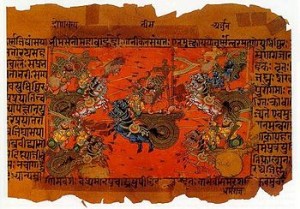
A page of the ancient Mahabharata
Vrajanatha: What is the evidence that priti is the ultimate goal for the jiva?
Babaji: It is said in the Vedas:
prano hy esa yah sarva-bhutair vibhati Mundaka Upanisad (3.1.4)
The Supreme Person is the Life of all that lives, and He shines within all beings. Those who know that Supreme Personality by the science of bhakti do not look for anything else.2 Such jivan-muktas are endowed with attachment for the Supreme (rati), and they participate in His loving pastimes. Such bhaktas are the best of all those who are in knowledge of brahma.
In other words, the most fortunate of those who know brahma associate with Krsna actively in His loving pastimes. This sentiment of rati is a symptom of love for Krsna. It is explained further in Brhad-aranyaka Upanisad (2.4.5 and 4.5.6):
na va are sarvasya kamaya sarvam priyam bhavaty
atmanas tu kamaya sarvam priyam bhavati
Yajna-valkya said, “O Maitreyi, everyone is not dear to us because of their necessities; rather, they are dear to us because of our own necessities.”
It is evident from this mantra that priti (love for the Supreme)is the only prayojana for the jiva. Baba, there are many examples ofsuch statements in the Vedas, Srimad-Bhagavatam and Taittiriya Upanisad (2.7.1):
No topic other than the glories of Sri Krsna holds any further interest for those who are liberated beings (jivan-mukta).
raso vai sah ko hy
evanyat kah pranyat
yad esa akasa anando na syat
esa hy evanandayati
The para-brahma, Paramatma, is nectar personified. The jiva finds pleasure in associating with that nectarean Paramatma, and who could live if He was not present in the heart? It is Paramatma alone who gives bliss to the jivas.
The word ananda (bliss) is a synonym for priti (affection). All living beings are in search of pleasure and bliss. A mumuksu believes that liberation is the ultimate pleasure, and that is why he is mad for liberation. The sense enjoyers (bubhuksus) believe that the objects of sense gratification are the ultimate pleasure, so they pursue the objects of sense gratification until the end of their lives. It is the hope of achieving pleasure that induces everyone to perform all his activities. The bhaktas are also endeavoring for Sri Krsna’s devotional service. In fact, everyone is looking for priti –so much so that they are even ready to sacrifice their lives for it. In principle, everyone’s ultimate aim is priti, and no one can disagree with this. Everyone is exclusively searching for pleasure, whether they are believers or atheists, fruitive workers, karmis, jnanis, and whether they have desires or are desireless. However, one cannot achieve priti simply by seeking it.
The fruitive workers believe that celestial pleasures are the ultimate bliss, but it is explained in Bhagavad-gita (9.20):
ksine punye martya-lokam visanti
After the residents of the gigantic celestial planets have completed the results of their good karma, they have to take birth again on the mortal earthly planets. The karmis who desire sense gratification constantly transmigrate from one planet to another in this way.
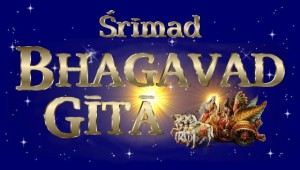
The Bhagavad Gita is the essence of the Mahabharata
According to this sloka of Gita, everyone realizes their mistake only when they fall from the celestial planets. A person may begin to covet the pleasures of the heavenly planets again when he fails to find pleasure in the wealth, children, fame and power that is available in the world of human beings. However, while he is falling from the celestial worlds, he adopts a respectful attitude towards an even greater happiness than that of Svarga (the heavenly planets). He becomes indifferent to the pleasures of the human worlds, the celestial planets and even the higher planets up to Brahmaloka when he understands that they are all temporary, and that their happiness is also not fixed or eternal. He then becomes renounced and starts to investigate brahma-nirvana and endeavor earnestly for impersonal liberation. However, when he sees that impersonal liberation also lacks bliss, he takes an unbiased (tatastha) position and searches for another path that will enable him to achieve priti, or pleasure.
How is it possible to experience priti in impersonal liberation? Who is the personality who is supposed to experience such bliss? If I lose my identity, who will exist to experience brahma? The very concept of the bliss of brahma is meaningless because whether there is pleasure in brahma or not, the theory of impersonal liberation does not admit that anyone actually exists in the liberated state to enjoy such pleasure. So what conclusion can be drawn from such a doctrine? If I cease to exist when I am liberated, then my individuality is lost along with my existence. Nothing pertains to me any more by which I can experience bliss or pleasure. Nothing exists for me if I myself do not exist. Someone may say, “I am brahma-rupa.” However, this statement is false, because the “I” who is brahma-rupa is nitya (eternal). In other words, if one says that he is brahma, then he is also eternal. In that case, everything is useless for him, including the process to attain perfection (sadhana) and perfection itself (siddhi). Therefore, priti is not to be obtained in brahma-nirvana. Even if it is perfect, it is something that is not experienced, like a flower growing in the sky.
Bhakti is the only path by which the jiva can attain his true goal. The final stage of bhakti is prema, which is eternal. The pure jiva is eternal, pure Krsna is eternal, and pure love for Him is also eternal. Consequently, one can only attain the perfection of true love in eternity when he accepts the truth of acintya-bhedabheda. Otherwise, the ultimate goal of the jiva, which is love for the Supreme, becomes non-eternal, and the existence of the jiva is also lost. Therefore, all the sastras accept and confirm the doctrine of acintya-bhedabheda. All other doctrines are simply speculation.
Vrajanatha returned home in a blissful state of mind, deeply absorbed in thoughts about pure spiritual love.
THUS ENDS THE EIGHTEENTH CHAPTER OF
JAIVA-DHARMA,
ENTITLED
“PRAMEYA: BHEDABHEDA-TATTVA”
The book is available as a free PDF file from here

 Posted in
Posted in 




